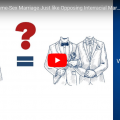If 40 states had legalized same-sex marriage, would the media consider the fight over, or would they think there still might be hope that the traditional definition of marriage could make a comeback?
That’s the situation I consider as I hear people say that same-sex marriage is a “forgone conclusion.” Here’s the truth: Thirty-two states have put the question of marriage to their voters, and all 32 of those states—including California—have defined marriage as the union of one man and one woman.
In 2004 state marriage amendment efforts sprung up in droves for one purpose: To preserve the traditional definition of marriage. Many liberal commentators have speculated that the entire marriage amendment effort was orchestrated by some high-ranking official at George W. Bush’s reelection campaign—an effort to turn out conservative voters for Bush. I assure you it absolutely was not.
It was a reaction. The winter before, officials in San Francisco had illegally chosen to ignore the law by authorizing same-sex marriages within the city; the following May, a judge in Massachusetts issued a ruling legalizing same-sex marriage. The rest of the country reacted to those two incidents, and the marriage amendments of 2004 were the result.
Four years later, Californians were asked to weigh the definition of marriage. California is considered by many to be the most liberal state in the nation, but Californians still voted to pass an amendment defining marriage as the union of one man and one woman. That’s the liberal equivalent of Texans voting to pass a ban on firearms!
So let’s assess this situation:
- Marriage amendments have arguably never failed at the ballot box.
- Thirty-two states have passed constitutional amendments defining marriage as the union of one man to one woman.
- Other states have passed legislation to the same effect, meaning that altogether nearly four out of five states have taken a stand in favor of the traditional definition of marriage.
But the media and leftwing liberals still maintain that same-sex marriage is a forgone conclusion. Why? On what grounds?
Because the President of the United States says he supports same-sex marriage, and pushed for the repeal of Don’t Ask, Don’t Tell despite vocal opposition from some high-ranking military members? This is the same president whose administration elected not to do its job defending the Defense of Marriage Act in court. Does this signify that public opinion and public policy are actually shifting on this issue, or does it simply indicate our current president has some very strong—very liberal—opinions on the matter of marriage?
Will you say it’s a forgone conclusion because of TV shows that portray homosexuality in a positive light, or because the upcoming generation of teens is supposedly more “gay friendly” than previous generations? If we used those standards to judge the future, we would expect aging Baby Boomers like myself to still be running around with flowers in their hair, throwing enormous parties in fields across the country. Perhaps a few still do, but not in the droves you would have predicted back in 1969. And which generation was it that started Focus on the Family, The 700 Club, American Family Radio, and made Rush Limbaugh popular? It was Baby Boomers—albeit a little older and a little wiser than they had been previously.
Thirty years ago abortion was a forgone conclusion. Many—both pro-life and pro-choice—told me pro-life activists were beating a dead horse, and that as soon as that generation of pro-lifers died off, abortion would be about as controversial as vaccinations and organ transplants. Today, a new generation of pro-lifers is taking a stand, and abortion is arguably more controversial than ever. The “forgone conclusion” of decades past is on the verge of eradication in parts of our country.
In this work, you can never really declare a fight over or an issue a forgone conclusion. In the case of marriage, however, there’s simply no way you can ignore the fact that Americans have so overwhelmingly spoken in favor of defining it as the union of one man and one woman. If you must declare one definition of marriage to be the forgone conclusion—if you feel you must point to one side as victor in the debate over marriage’s definition—then there’s really no way around it: The traditional definition of marriage is winner by a landslide.




